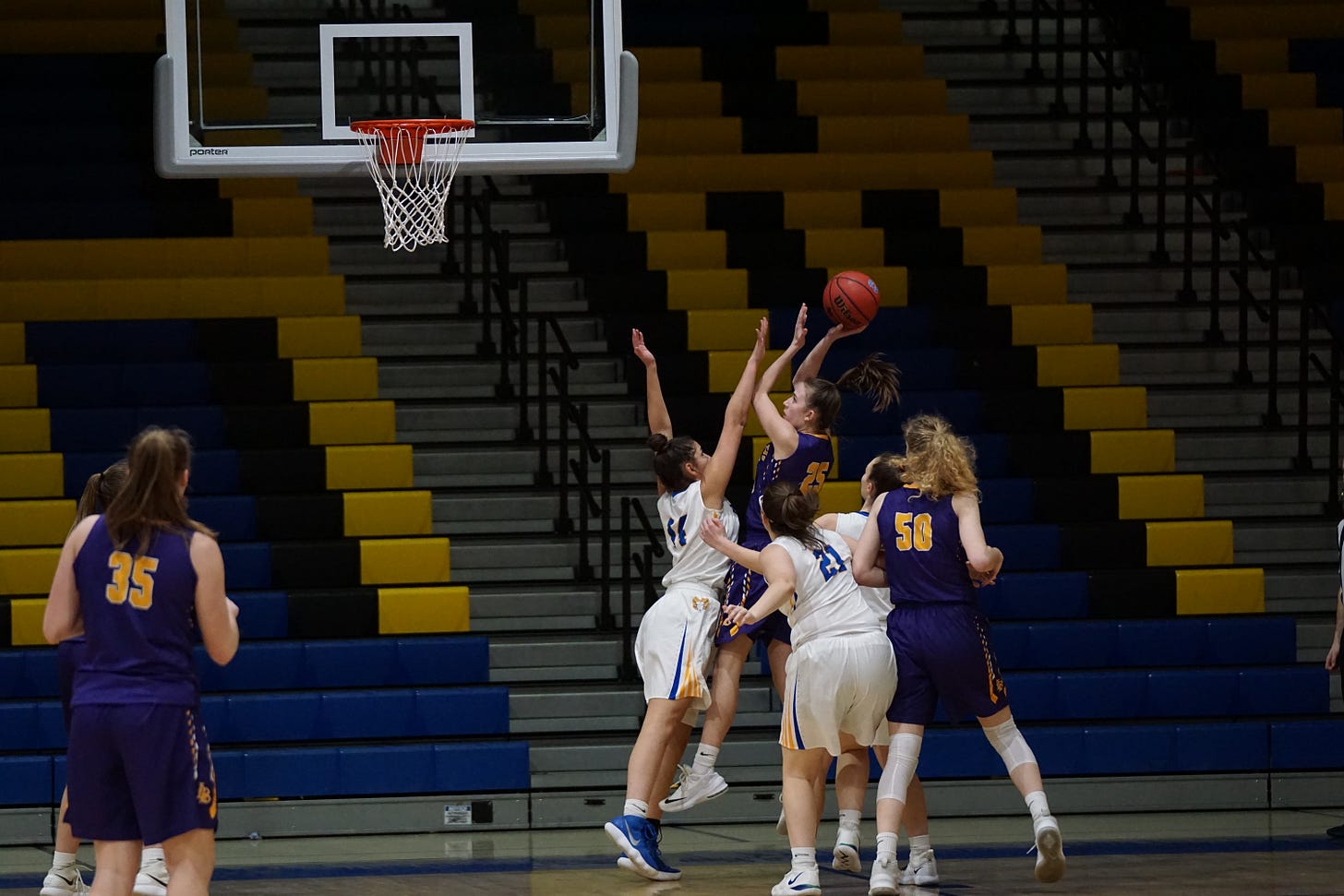Summer of 1994, a 1987 Toyota Tercel & Typecasting in Youth Sports. How a Summer Basketball Camp in Maine Changed a Coaching Perspective.
Typecasting in youth sports can impede development. Part of a coach's job is to allow development through new experiences. Here is a reminder on how.
Every Sunday I share an email called The Physical Movement discussing leadership through youth sports & fitness. If you would like to receive it directly in your inbox, subscribe now.
It was the summer of 1994. I had my 1987 Toyota Tercel with the noisy exhaust packed up and ready to go. I was leaving my home in Pointe Claire (suburb of Montreal) on the 6 hour drive to Orono, Maine.
The typical gym teacher using summer months to work at camps to make some extra money. That is a typecast of a coach/teacher is it not? (typecast is an acting term where an actor repeatedly gets assigned the same type of role. I am sure you can think of many examples from the big screen).
I will come back to this term in a few minutes.
It was the summer of the Montreal Expos having the team. They were leading the National League East and stacked with future Hall of Famers. They were going to win the World Series, finally. They had the best team in baseball. Nothing could get in the way. Except. Well. Puh.
Back to the trip.
It was also the summer that I left the education world and moving to a new job in business. Before I embarked on a career in fitness equipment, a career that would change my professional journey, I had this commitment to coach down at the University of Maine’s Women’s Basketball camp. I had committed a number of months prior, and although the timing was not great with a new job looming, it had become part of my summer routine to work the camp circuit.
This was a different however.
This was girls basketball, in the USA. My women’s basketball coaching experience was limited to an assistant role with Sun Youth in Montreal, a summer team that played in a few AAU tournaments the previous summer. This was an American university. Any Canadian coach or player knows that when you cross the border to dip your toe into the waters of American sports culture, well, it was likely to be different.
Approaching the experience was bittersweet. This was exciting from an experience standpoint. Something new and challenging. But also represented a changing of career journey. This would likely be the last experience where I would immerse myself all into the world of full time coaching & teaching.
Rolling into a university town is a special feeling. The colors are unified, and the vibe is energetic. Orono, Maine at the end of July qualified on all fronts. There was no mistaking this was the home of the Black Bears.
While my car barely made it, I was fresh and ready to go. It was a Saturday evening, the campers were rolling in on Sunday and it was time to find my deluxe accommodations in the dorm!

Sunday morning came quickly, and coaches breakfast triggered a week like no other. If you have ever spent time with a group of coaches in a setting like a summer camp, you know that it feels a little like Christmas. Great anticipation, lots in common and lots to talk about. As the only Canadian on staff, it took no time to strike up conversations and compare notes with the others.
If you coach at a summer camp, it is because you want to be there. Many have chosen to be away from their families for a week during their summer holiday. Most were teachers as I was and most were focused on gearing up for a week of learning and instruction. There were also the young coaches. Those transitioning to teaching just out of university. The first meal turned into 3 hours of getting to know coaches and exchanging stories, philosophies and perspectives.
It was on.
Campers rolled in early Sunday morning, and like most camp settings, there was no time wasted in getting started.
Later afternoon represented first time hitting the court for the week, and right off the hop the energy level was high. The campers were girls 14-18, most headed into their junior or senior years of high school, some had graduated and tuning up for their first year of college ball. The skill level was noticeably high right through the first few drills.
This became a treat for so many reasons. The atmosphere of the camp was very positive and collaborative. This is a different vibe that in season or tournament competition. Everyone was smiling and ready to focus on getting better, coaches and athletes alike.
The profile of the young athletes was particularly refreshing. Like the coaches, they were there because they wanted to be. Many had worked outside the home to get the funds to participate. Each coach was assigned a group that became their team for the week. There were some modifications made in the first day based on ability to level things out, but what this allowed us to do was spend some time and get to know our campers.
We had meals together. We did more than just spend time on the court, we also did some strategy in the classroom.
Getting to know the athletes was a highlight of the week. Their background, sacrifices, hopes and dreams.
After 1 day of drills and work on the court, I started to quickly get a sense of what role each could play within the team. The scrimmages against other teams started at the end of day 1 and we had little time to get each role figured out.
Point guard, shooting guard, post play, shooting forward, rebounders, speed players, ball handlers, we had many roles to fill.
What started innocently enough turned out to be a key in our team coming together very quickly. Because I did not know the girls or their playing history, I simply evaluated their strengths and started to place them in roles.
For example, our best ball handler was taller than the rest of the team, and our best rebounder was not. We also had some very athletic girls. Some had a better offensive touch that others, but most had a real strong work ethic. They hustled.
By the way, there is something different about coaching girls than boys. I had not yet coached much baseball or soccer (that came later with my son), but I had coached football, hockey and basketball at the high school boys level and only basketball for girls. I also refereed basketball in both girls and boys.
I had a hard time putting my finger on it at first. With the girls, they seemed much more comfortable within a team concept quicker than the boys. They also had a better grasp on individual and team fundamentals. Inbounds plays, breaking the press, running a basic offence and defence or even just finding the open person when we had the ball. It is something I really enjoyed about coaching girls. I did not have to teach as many of the benefits of giving up the shot to a teammate who was in a better position, for example.
Back to our week.
The players got their position assignments and much to my amazement they gelled quickly. Our 6’2” ball handler ran the point seamlessly. We did not have much time to insert plays, so we kept it simple. A few options off some basic high/low screens. A few passes as the trigger point to run the offensive options. We kept our offence moving. That was it. Very quickly in our first game, our offensive sets created high percentage open shot after open shot.
It was obvious I had been blessed with a good team as our basic defensive sets, both in man to man (girl to girl!) and zone worked very well. Communication amongst the players was outstanding in identifying help needed on D.

The most gratifying part of how the week unfolded was that these girls were having fun. Everyone played, everyone ran, and everyone contributed. Our practices were not physically intense because our games were demanding. For those not having done a weeklong summer camp, the girls are on the court at least 2x per day, and sometimes 3x. 1 game per day, with 2x later in the week, then some practice time. To run them hard in practice seemed counterproductive. We walked through some team concepts, worked on some technical skills and we played some low intensity shooting or passing games during practice.
It was only as the week went on that I realized how well this was coming together. We were coming out on the winning side of our games, but that was not the purpose of the camp. The purpose was skill development and fun. The competition level was impressive. The smiles were constant, the support amongst the girls was terrific considering most had never met and some had only known each other through some heated competition back home.
We did not end up losing a game that week.
We played some talented teams, and the quality of basketball was exceptional.
After our last game, and being successful fresh on their minds, I had a chance to have a lunch with the girls.
I knew I would not see them again but wanted to get some feedback on their week. The vibe was exceptional all week. No problems (I had worked enough camps over the years to know this chemistry was rare). Everything requested turned to gold.
So, I wanted to know, why did they think it went so well?
The answers surprised me. Answers I had not thought about.
Almost to a person, the young ladies said that they had fun during the week because they played a role on the team they were not used to playing.
As it turns out, many of them were typecast early in their high school careers into roles on the team and that did not change much. During this week, our 6’2” MVP (who went on play D1 ball) played guard for the first time since elementary school. She loved it. The smaller, hardworking “guard” who I played with a focus on rebounding not only scored more than usual, but also became dominant on the boards. That was not her role in high school in her hometown. This was the same pattern with the 8 others on the team. They all said the same.
I thought of that a lot on the way home from Maine after my week. I have also thought about it a lot over the years.
In many communities, our youth sports teams stay together as they get older. This is common in hockey, basketball, soccer, baseball and volleyball in the community I live in. Often, it is the same coach that works with them through the years on the community team. The role of typecasting becomes the norm and may limit development. Defensive players on the hockey team stay there because they have always been there. In baseball, positions are determined when they are young and not adjusted. Athletes and coaches defer back to the norm.
Typecasting can be a challenge to development that we, as coaches, need to recognize. Especially in smaller communities where tryouts have lower turnout than bigger communities.
I will never forget that week in Maine. It was a great reminder of everything I loved about coaching and teaching.
It also provided a valuable lesson in typecasting and making sure we give our young athletes the chance to take on different roles as they develop.
That, really, is a fundamental point in development.








